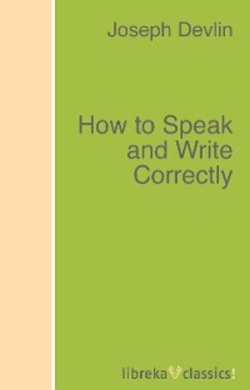Читать книгу How to Speak and Write Correctly - Joseph Devlin - Страница 16
ADJECTIVE
ОглавлениеAn adjective is a word which qualifies a noun, that is, shows or points out some distinguishing mark or feature of the noun; as, A black dog.
Adjectives have three forms called degrees of comparison, the positive, the comparative and the superlative.
The positive is the simple form of the adjective without expressing increase or diminution of the original quality: nice.
The comparative is that form of the adjective which expresses increase or diminution of the quality: nicer.
The superlative is that form which expresses the greatest increase or diminution of the quality: nicest.
or
An adjective is in the positive form when it does not express comparison; as, "A rich man."
An adjective is in the comparative form when it expresses comparison between two or between one and a number taken collectively, as, "John is richer than James"; "he is richer than all the men in Boston."
An adjective is in the superlative form when it expresses a comparison between one and a number of individuals taken separately; as, "John is the richest man in Boston."
Adjectives expressive of properties or circumstances which cannot be increased have only the positive form; as, A circular road; the chief end; an extreme measure.
Adjectives are compared in two ways, either by adding er to the positive to form the comparative and est to the positive to form the superlative, or by prefixing more to the positive for the comparative and most to the positive for the superlative; as, handsome, handsomer, handsomest or handsome, more handsome, most handsome.
Adjectives of two or more syllables are generally compared by prefixing more and most.
Many adjectives are irregular in comparison; as, Bad, worse, worst; Good, better, best.
